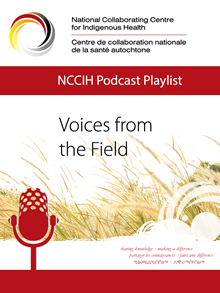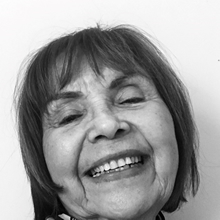 NCCIH Voices from the Field Podcasts
NCCIH Voices from the Field Podcasts
Voices from the Field
Welcome to Voices from the Field, a podcast series produced by the National Collaborating Centre for Indigenous Health (NCCIH), which focuses on innovative research and community-based initiatives promoting the health and well-being of First Nation, Inuit and Metis peoples in Canada.
Episode 14: Doris Young on respecting our kiteyak during COVID-19
This episode is focused on Doris Young’s April 30, 2020 op-ed in the Winnipeg Free Press, We must remember our responsibility to our elders. A member of the Opaskwayak Cree Nation (OCN), located in northern Manitoba, Ms. Young is a strong advocate and voice for her fellow community Elders, as well as those from non-Indigenous communities. Observing the poor treatment of many non-Indigenous seniors living in nursing homes across Canada, she wrote, “In this troubled time, the elderly are suffering far too much. They have paid far too high a price for getting old. Too many of the nursing homes they have been placed in have not been caring responsibly for these precious community members.” In the following episode, Ms. Young shares Cree concepts on Elders and reminds us of their significant role for cultural continuity and community well-being. She does this so that we remember our responsibilities to them during a pandemic like COVID-19.
Listen on SoundCloud
Bio
 Doris Young
Doris Young
Doris Young is a member of the Opaskwayak Cree Nation (OCN) of The Pas, Manitoba. A retired educator and researcher, she has specialized in government policy, program development and evaluation, and has taught courses at the University of Manitoba, the University of Winnipeg, and the University of Regina. She has lent her extensive experience to various boards and committees including the University of Manitoba Board of Governors, the Health Science Centre Aboriginal Services Committee, Norman Regional Health Authority Board of Governors, the Women's Advisory Council to the Manitoba Keewatinowi Okimananak, the Child Review Committee on Deaths of Aboriginal Children in Care, and the National Centre for Truth and Reconciliation. As a Residential School Survivor, Ms. Young is committed to finding ways for Indigenous people to work towards reconciliation with Canadian society. Ms. Young received the Order of Manitoba in 2012. She is a proud mother of three and a grandmother.
Transcript
Rick Harp: Welcome to Voices from the Field, a podcast series produced by the National Collaborating Centre for Indigenous Health. The NCCIH focuses on innovative research and community-based initiatives promoting the health and well-being of First Nations, Inuit and Métis Peoples in Canada. In this episode — advocacy for elders. Elders like Doris Young, a resident of the Opaskwayak Cree Nation in northern Manitoba, recently wrote about the treatment of seniors in Canadian long-term-care homes.
According to Young, “In this troubled time, the elderly are suffering far too much. They have paid far too high a price for getting old. Too many of the nursing homes they have been placed in have not been caring responsibly for these precious community members.”
Here, Young shares Cree concepts about Elders and the significant role they play for cultural continuity and community well-being, a call to remember our responsibilities to them during a pandemic like COVID-19.
Doris Young: Our Elders are not forgotten. People look out for them to see that they are okay and that they are not being harmed. I want to talk about the philosophy by which we live under. The Cree word for Elders really is kihtehayak, and that means that they are “the people of the heart”. That’s what kihtehayak means. So our language contains the way in which we are to address and look at our Elders. If they are people of the heart, we have a responsibility to them. They had a responsibility to us when they were at our age and looking after us. They carried with them the values of caring and sharing and being kind. Their usefulness was not forgotten. Their productivity is still valued in our communities. We are respectful to them. We value their knowledge. We look up to them to give us guidance and they still lead our communities in many ways. That’s how I would look at this issue of Elders and I’m speaking, when I say kihtehayak, I’m speaking about the Cree culture and the Cree language. That’s how I would look at how we treat our Elders.
Rick Harp: In her piece, Young had this to say, “[Elders] have given us so much and most don’t ask for anything in return. They need attention and love, as well as proper medical care. Love is not a financial cost; it is a human responsibility.”
This podcast was recorded on May 9, 2020. To hear more podcasts in this series, head to the Voices from the Field on the National Collaborating Centre for Indigenous Health, nccih.ca. Music on this podcast is by Blue Dot Sessions. It appears under a creative commons license. Learn more at www.sessions.blue.
Download the transcript